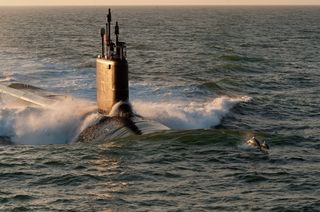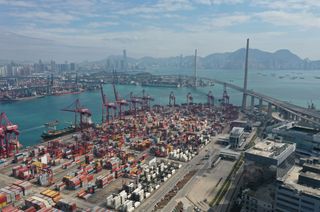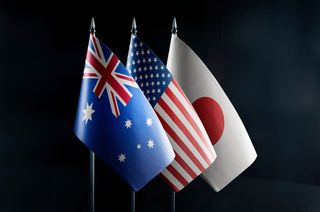Australian Financial Review
Obama and Putin are ironically in agreement about US foreign policy, writes
Insulting. Sickening. Outrageous. Sanctimonious. These are just some of the reactions of American politicians and opinion leaders to Vladimir Putin's critique of US foreign policy.
Writing in The New York Times, the Russian President chided American leadership, denounced US military intervention and scolded President Obama for speaking of American exceptionalism.
"Millions around the world," Putin lectured, "increasingly see America not as a model of democracy but as relying solely on brute force, cobbling coalitions together under the slogan 'you're either with us or against us'."
It is easy to dismiss Putin's remarks as the ranting of a Russian reactionary.
For one thing, he is hardly an exponent of liberal democratic values: he locks up dissidents, censors the media, punishes ethnic minorities in Russia's outer regions, and has essentially made himself president for life.
For another thing, like many outside observers, he all too easily rejects the notion of American exceptionalism, which has long shaped the American sense of national identity. This is the belief that the US — a nation born of an idea, embodying a principle, dedicated to a proposition, claiming a manifest destiny — is fundamentally different from other nations in its nature and behaviour.
One can disagree with American exceptionalism and still recognise that since the first English settlers landed in the 17th century, Americans have seen themselves as a chosen people destined to create a "city upon a hill" (John Winthrop), a "new order for the ages" (revolutionary founding fathers) and the "last best hope of Earth" (Abraham Lincoln) that would "make the world safe for democracy" (Woodrow Wilson). The same vision has been echoed in the idea of the American Century, which has shaped the national consciousness since World War II.
So, when Obama talks the language of exceptionalism, as he did in his White House address this week, he is representing the national psyche. That is why so many Americans have responded to Putin's message with disgust and anger.
And yet there is nonetheless something to be said for the Russian President's argument that the US, far from being exceptional, should recognise limits to power in a messy world that won't conform to American expectations.
The irony is that it is Obama (of all people), who recognises this reality.
Indeed, this President has turned out to be far less committed than most of his post-war predecessors to the notion that the US has a special mission to promote democracy and liberal values and impose its will and leadership across the globe.
In the wake of the financial crisis and the conflicts in Iraq and Afghanistan, he has attempted to define the US role in the world in a way that reflects America's changing circumstances and more limited resources.
One theme of his foreign policy is that it is time for the US to focus on "nation-building at home", something Obama has stressed several times in recent years. Another theme is the subtle emphasis on caution, prudence, balance, modesty and proportionality in dealing with adversaries and competitors.
For months, the Obama administration has wobbled between pity for the victims of a two-and-a-half-year-old civil war in Syria and fear of plunging the US into a conflict it neither understands nor can resolve.
In the aftermath of the chemical weapons attack on August 21, the President has attempted to prod US allies, as well as the American people, to support a military strike against the Assad regime. But there is no consensus at the United Nations, nor is there much support among Republicans and Democrats in Congress.
Until this week, Obama had been right to resist pressure to intervene militarily, but he has failed to explain satisfactorily why such caution has been the prudent course. While the causes of the conflict are complex, the case for non-intervention is not: one country did not invade another; more than 100,000 deaths took place before the use of chemical weapons claimed 1400 lives; and this is a morally ambiguous war between the regime and rebellion (with the former being aided by Russia and Iran and the latter by Turkey and Saudi Arabia).
But by unwisely warning that any chemical weapons use would cross a "red line" and by declaring regime change as a US goal — warnings that he never made in serious faith — Obama has allowed himself to be tossed about by events. The result is a paralysis in foreign policy.
The world had best get used to it, for the condition is unlikely to change. As polls consistently indicate, the American people are tired of the world. They are suffering from foreign policy fatigue.
The Cold War consensus — that Moscow was hell-bent on global domination and America had to contain Soviet Communism, on which Presidents from Truman to Reagan built US foreign policy — disintegrated more than two decades ago. And the post-9/11 consensus — that the US should embrace preventive war, regime change, aggressive unilateralism against an "axis of evil" — collapsed shortly after the fall of Saddam Hussein a decade ago.
The upshot is that Americans today appear less concerned about foreign policy than at any time since the heyday of isolationism between the world wars. In a polity that is acutely sensitive to public opinion, veritably driven by polls, focus groups and the relentless 24/7 news and internet environment, this means that foreign policy is severely downgraded in the calculations of politicians.
That is why foreign policy was the dog that did not bark in last year's presidential campaign. It is why more Republicans now care more about downsizing government than about a strong defence. And it is why a clear majority of Americans oppose any military strike against Syria, however odious the Assad regime is.
This is not just a populist feeling. Read this: "Twelve years of war. A sense that we're snakebit in the Mideast. Iraq and Afghanistan didn't go well. Libya is lawless. In Egypt we threw over a friend of 30 years to embrace the future. The future held the Muslim Brotherhood, unrest and a military coup. Americans have grown more hard-eyed — more bottom-line and realistic, less romantic about foreign endeavours, and more concerned about an America whose culture and infrastructure seem to be crumbling around them."
Whose views are those? Peggy Noonan, the former Ronald Reagan speech writer and columnist on the hawkish Wall Street Journal editorial page.
Noonan has been a long-time passionate neo-conservative, but her thesis that Washington should reorder priorities in favour of domestic affairs more or less reflects the feelings of a clear majority of Americans.
Nor is she alone among the leading foreign policy pundits. Other high-profile opinion leaders — George Will, David Frum, Robert Kaplan, Fareed Zakaria, Richard Haass (all of whom were leading advocates of the invasion of Iraq a decade ago) — have voiced similar critiques of a Pax Americana.
To the extent that such views prevail, they represent a dramatic turning point in the American world view: towards the caution and modesty of recent times and away from the hubris and sweeping proclamations of the post-9/11 era when American outrage over the terrorist attacks, taken together with the mental habits of American global hegemony and American exceptionalism, gave US leaders a clear, overriding sense of purpose and mission.
This sense of doubt and caution is especially evident at a time when the age of US unipolarity, which began with the collapse of Soviet Communism, is being increasingly replaced by a world populated by new players such as China, India, Turkey, Brazil — and, yes, even Russia.
Contrary to Putin's claims, the Russians are not champions of "international law" and "peaceful dialogue". They are merely playing a weak hand rather skilfully and are being allowed to do so because of considerable incompetence on the part of the Obama administration.
To be sure, the US will remain the world's most powerful nation: it boasts the largest economy and the most capable armed forces. Add to this its unique demographics and the potential for renewed economic growth, and it is clear that the US will remain the most powerful state in the world for the next generation or longer.
But the point here is that America no longer has the will, wallet or influence to impose an ambitious global leadership across the world. Although they express themselves in different ways, both Putin and Obama know it.
This article was originally published at the Australian Financial Review




